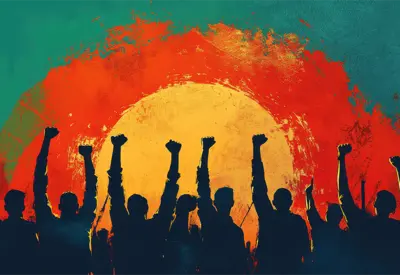As geopolitical competition increases, African states face growing pressure to pick sides. Sanusha Naidu, a Senior Research Fellow at the Institute for Global Dialogue, argues that real agency will not come from choosing between external powers, but from strengthening Africa’s own regional institutions—especially the AfCFTA—to shape investment, bolster bargaining power, and build a coherent continental market.
In August 2025, Botswana’s state-owned development corporation signed a huge $12 billion investment deal with Qatar’s Al Mansour Holdings with the potential to reshape the African nation’s economy. The agreement promises investment in roads, farming, mining, diamond refinement, energy, defense, and cybersecurity.
But there is also speculation that the proposed deal could allow the government of Botswana to purchase the 85% stake in the De Beers diamond company that its owner Anglo American is seeking to sell off. The government already owns a 15% stake; Qatar’s backing could allow Botswana to take full control. As yet, there is no confirmation. In 2024, the diamond market collapsed, hitting Botswana hard. The timing of Qatar’s investment is not coincidental—the Gulf state has its own interests in becoming a trading hub for precious metals and gemstones. Backing Botswana’s bid for De Beers would give it significant leverage in the global diamond trade.
This story highlights a number of significant issues facing African nations. It demonstrates the liquidity constraints faced by African governments when competing for stakes in ownership structures. It reveals the rising strategic interest of Gulf investors, particularly the UAE and Qatar, in becoming dominant players in Africa’s critical minerals and energy sectors. It also exposes the tension between national industrial ambitions and regional competition— currently, for example, Angola is also vying to compete with Botswana for the De Beers stake.
___
With weak regional frameworks guiding investment, African countries risk entering bilateral deals that, while beneficial nationally, do not advance regional markets or support intra-African trade.
___
It also underscores the core challenge: with weak regional frameworks guiding investment, African countries risk entering bilateral deals that, while beneficial nationally, do not advance regional markets or support intra-African trade. The question, therefore, becomes: How can these national projects be aligned with regional priorities?
Africa’s intra-regional trade levels remain among the lowest globally—typically between 14 and 17% of total trade. The continent’s major trading partner remains the European Union. China is deeply embedded, but its trade volumes with Africa (approximately US$250–300 billion) are relatively small when compared with its bilateral trade with single countries such as Vietnam, which can reach similarly high levels.
The current pattern shows the degree to which African exports are concentrated in commodities. Value-added intra-African trade is limited by tariff barriers, non-tariff barriers, and poor connectivity. The goal for African states should not be to reduce global trade, but to optimize leverage and channel external investments into building regional markets and industrial bases. This is where customs unions and common external tariffs become critical. Harmonized tariffs reduce distortions, support regional manufacturing, and prevent individual states from undercutting one another in negotiations with external investors.
Africa needs a single market, and the plan for the African Continental Free Trade Area, or AfCFTA, was launched in 2021 with the aim of creating this. 54 out of Africa’s 55 nations have signed up to it, with Eritrea the only holdout. The AfCFTA is central to any argument for enhancing African agency. If effectively implemented, it can transform fragmented national markets into a unified continental market of 1.3 billion people with a combined GDP exceeding USD 3.4 trillion.






















Join the conversation